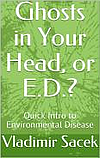|
■
Home ■ site map |
|
|
On Amazon:
|
YOUR BODY HEALTH RECIPE NUTRITION TOXINS SYMPTOMS
▪ Genes ▪
Metabolism
Cellular metabolism
Amino acids Your body cells and health What always comes to mind at a mention of human body is its gross anatomy: skeleton, muscles, organs, skin, head, torso, limbs. But what really makes up your body is a myriad of tiny, invisible live entities - your body cells. They are smaller than 0.02mm on average, yet it is their wellbeing, and the efficiency of their combined activity that more than anything else determines how do you feel. Or, for that matter, whether you are alive, or not. And what keeps this tiny army of workers healthy, efficient and alive - or not - is, more than anything else, nutrients from food processed by digestion and supplied to them. Ever thought of how the nutrients you ingest are used to regenerate your body? While incredibly complex in its details, the big picture is pretty simple. Inside your digestive tract, the food is broken down into nutrients, pulled from intestines into the blood stream, and sent with it as a fuel and material to some 100 trillions of cells making up your body. If you are curious about "cell census" data, your tissue cells count for about 10% of the total, or some 10 trillion cells; various types of blood cells total nearly four times as many, or 40 trillion; a few more trillions go for lymph cells and immune-system cells. And if your intestine is healthy, it is home to some 40 trillion friendly bacteria (which is, evidently, either much smaller than a body cell, or pretty badly squeezed in). Count in dozens of trillions of commensal and unfriendly bacteria, fungi and viruses, (which are not cells, but do seek their place under your sun nevertheless) and you have much greater number of guest organisms to take care of, than of your own cells.
Every second, millions of your cells die, and need to be replaced with new ones (worry not - it still makes only a small fraction of your total cell count). While young, your body is creating more cells than it loses; as you age, this gradually turns around. In any case, in order to sustain life of all those cells - that is, your own - you have to supply them with necessary nutrients. It is the bloodstream that carries this flow of life: blood forced out of the capillaries by the pulsating force of heartbeats baths the cells with nutrients and body-produced substances they need for proper functioning and regeneration. After fluid exchange with the cells, most of intracellular fluid is absorbed back to capillaries (small portion is absorbed by the lymphatic system), taking cells' metabolic waste to the channels of elimination: intestine, kidneys and skin. The constant flow of blood ensures that this process never gets interrupted. The big picture is as simple as that. Contents of the tissue fluid vary with the tissue and organ it surrounds, according to their specific functions. As long as it contains just what it needs to accomplish its nourishing, regulatory and janitorial functions to body cells, you are healthy. If it is missing something, or contains significant levels of destructive or interfering agents - the notorious among these being free radicals, chemical toxins or energy fields - your health suffers: the stage for the onset of a disease is set. Your cells' nourishment and protection are the two out of three main ingredients of the recipe for health. You want to keep your cells happy, and give to them all they need to function, regenerate and multiply optimally. And, just as important, to protect them from harm. Part of making sure that your cells get what they need is paying attention to your body's metabolic preferences. Not only that it will make you feel better if you eliminate foods that fall short of making you feel energized, or cause discomfort - foods that your body does well with may tell you something important about your health. Optimization of your food intake is an ongoing, never ending process, for your nutritional needs - as well as your metabolism - vary from one time period to another, not seldom significantly. The most complex, and least understood part of body's metabolism is cellular metabolism - and it is the very foundation of your health. The myriad of body cells work in amazing harmony. They are grouped and organized to perpetuate the cycle of life. Somewhat informally, we can sum up these basic functions as:
∙
acquiring
oxygen (respiratory) and nutrients (eating,
drinking, While each phase is necessary for the completion of the life cycle, the quality of it - in addition to the genetic base - clearly depends primarily on the quality of nutritional intake and digestion, as well as on the efficacy in elimination of toxic and potentially harmful agents. Since there is little you can do to optimize your genes, your main supports in the battle for your health are good digestion, quality nutrition and efficient detoxication. YOUR BODY ┆ HEALTH RECIPE ┆ NUTRITION ┆ TOXINS ┆ SYMPTOMS |






No one has commented yet. Be the first!